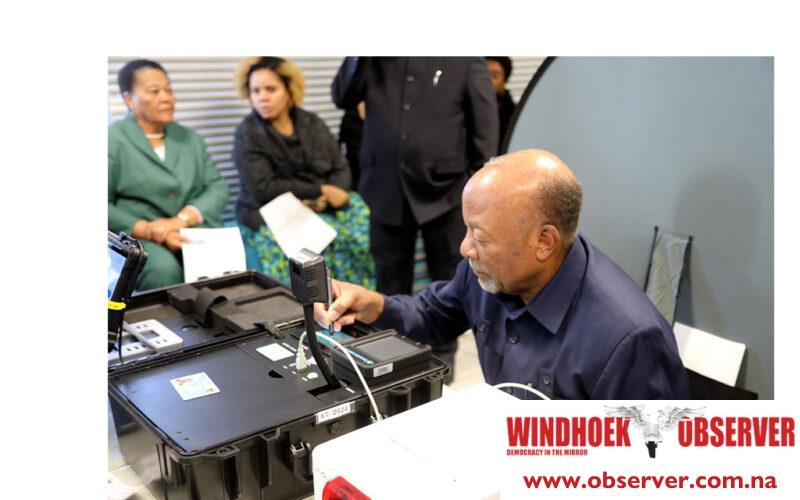Stefanus Nashama and Niël Terblanché
Political and traditional leaders braved the cold weather on Monday to go and register for voter cards for the presidential and national assembly elections set for the end of November.
President Nangolo Mbumba, accompanied by First Lady Sustjie Mbumba, marked the beginning by registering for 2024.
They received their voter cards this morning at the MTC building in Olympia, Windhoek.
President Mbumba urged all eligible citizens, aged 18 and older, to register and exercise their constitutional right to vote in November.
“Elections do not give you the right to destroy your country because your country must stay in peace and unity. Your people must enjoy those rights that are enshrined in our constitution,” he said.
Joining the president in promoting voter registration is SWAPO’s presidential candidate, Vice President Netumbo Nandi-Ndaitwah.
She encouraged Namibians to find their nearest registration point and participate in the electoral process.
Panduleni Itula, leader of the Independent Patriots for Change, called on young people to register in large numbers to shape their desired future in the upcoming elections.
Itula, who also registered for his voter card, described the process, led by young individuals, as smooth and effective.
“Just register as a voter for the upcoming elections. Namibians, let us unite and ensure our voices are heard. Take a few minutes to register. Don’t wait until the last minute. Our nation’s future depends on our participation,” he said.
The Queen of Oukwanyama traditional authority, Martha Mwadinomho Christian ya Nelumbu, has urged the Namibian people to go out in large numbers and register for voter cards to participate in the upcoming November elections.
Nelumbu’s call targets young people to make sure they vote while strongly encouraging them to register for the voter cards.
“Young people should come and register voting cards for themselves. Who else would not be registering while I have done so,” she reiterated.
She was accompanied by Ohangwena governor Sebastian Ndeitunga when she went to get a card at the Omhedi village in the Ohangwena region.
Political analyst at the University of Namibia, Ndumba Kamwanyah, said this year’s election is going to be very competitive.
He added the queen had recognised the importance of voting and that it was good for her to encourage Namibians to go register and vote.
“We do not hear much from the traditional authorities to encourage people to vote. That is a very good example from the queen,” he mentioned.
Kamwanyah expressed that he hopes political parties and the Electoral Commission of Namibia (ECN) will do the same.
He added that people should not be encouraged to vote for a particular party but should do so democratically to ensure that their votes determine the future.
Linking Namibian politics to South Africa, Kamwanyah highlighted that the African National Congress (ANC) is an example of today’s politics.
“You know the Swapo and ANC are not far from each other because of the role they played to liberate the countries, but I think Swapo is still going to win elections, but not with the two-third majority in the national assembly,” he reasoned.
The ANC lost in the recent elections, with only 40 percent down from 57.5 percent in the 2019 elections. This means the ANC will now have to form a coalition.
During the voter registration exercise, the Electoral Commission of Namibia (ECN) hopes to register more than 1.7 million eligible voters.
This exercise, conducted every ten years, ensures that the electoral roll is up-to-date for the forthcoming elections.
Last week, Zenia Klazen, the ECN’s director of operations, revealed that the commission had undertaken regional council consultations throughout 2022 and 2023 to establish registration systems and polling venue frameworks.
Klazen said that substantial efforts have been made to engage stakeholders to refine the registration and polling venues.
She said that the general registration of voters will span 52 days, from 3 June to 1 August, with registration points operating from Monday to Saturday between 08h00 and 19h00.
In the meantime, election registration officials have been dispatched across the country to ensure a smooth registration process.




